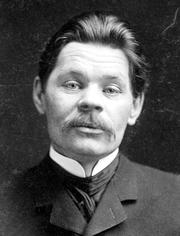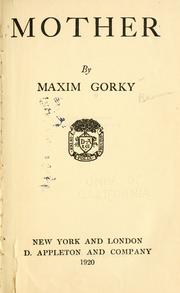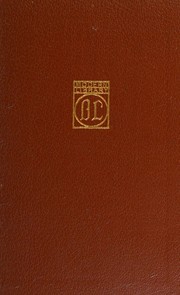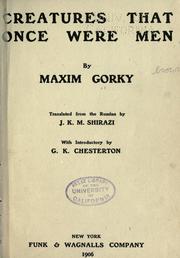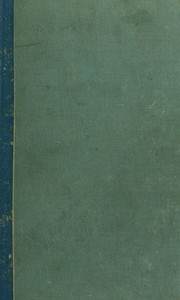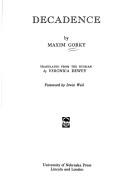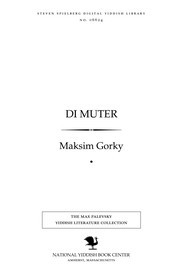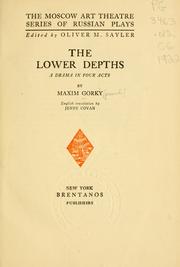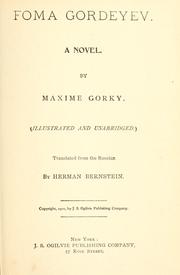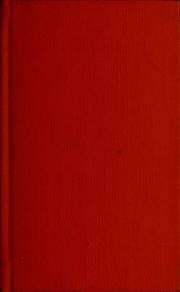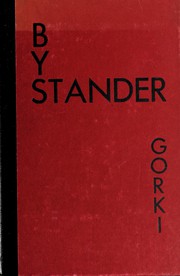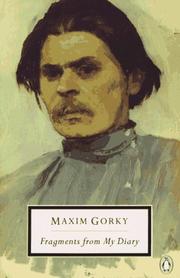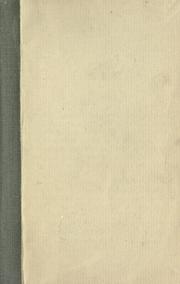Gorky, Maxim or Maksim [Rus.,=Maxim the Bitter], pseud. of Aleksey Maximovich Pyeshkov, 1868-1936, Russian writer. Gorky is considered the father of Soviet literature and the founder of the doctrine of socialist realism.
Instilled by his grandmother with a love of romantic tales and great sympathy for mankind, Gorky began a nomadic life at 12, wandering the Volga area. Since the czar's schools were closed to peasants, he educated himself, an experience he describes in My Universities (1923). He held dozens of menial jobs, publishing his first story in 1892. Gorky then became a journalist and married a colleague on the Samarskaya Gazeta. His articles exposed local corruption and he soon lost his job.
In 1898 Gorky's collection Sketches and Stories was published by a radical press and the author was an immediate sensation. These romantic tales concern the vigor and nobility of the Russian peasants and workers. About 1900 he turned to writing novels of social realism. Of these, Mother (1906) had the greatest impact on Soviet literature. Describing the awakening of revolutionary feeling in an ill-treated peasant woman, it became the prototype of the revolutionary novel. At this time Gorky became close friends with Leo Tolstoy and Chekhov, about both of whom he later wrote superb Reminiscences (tr. 1946).
Gorky donated most of his income to the revolutionary movement. He was arrested frequently but treated carefully because of his tremendous popularity. The czar rescinded his election to the Academy of Sciences in 1902, whereupon Chekhov and Korolenko resigned in protest. Gorky wrote 15 plays, two of which, heavily censored, were enormously successful at the Moscow Art Theatre. One of them, The Lower Depths (1902), a study of the wretched lives of derelicts, remains a classic. His plays, at first modeled on Chekhov's, emphasized characterization over plot.
After the failure of the 1905 revolution, in which he took part, Gorky sought to raise funds for the movement abroad. Following an initial triumphant reception in the United States (1906), he was insulted and mistreated there because his traveling companion was a woman who was not his wife. Settling in Capri (1906-13), he set up a Bolshevik propaganda school before he returned to Russia in 1914.
Although philosophically at odds with Lenin, Gorky was able to extract from him aid for many intellectuals and artists in an era of intellectual restriction. Exhausted from his work as head of the State Publishing House and by bouts with tuberculosis, he sought rest abroad (1921) and returned in 1928. His final, unfinished work, often considered his masterpiece, is The Life of Klim Samgin (1927-36), a panoramic four-volume novel of Russian social conditions from 1880 to 1917. Gorky's death at 68 has been ascribed to assassination by poison, perpetrated according to one view by an anti-Soviet group.
Gorky's work was remarkable for its vitality and optimism. It revealed, within its devotion to realism, a strong poetic strain and an eternal passion for justice. By the example of his work and life and by his literary criticism Gorky exerted a profound influence on Soviet thought. Most of his works have been translated.
903 works Add another?

Most Editions
Most Editions
First Published
Most Recent
Top Rated
Reading Log
Random
Showing all works by author. Would you like to see only ebooks?
Subjects
Russian Authors, Russian literature, Biography, Translations into English, Correspondence, Fiction, History, History and criticism, Social life and customs, Russian Short stories, Intellectual life, Gorky, maksim, 1868-1936, Translations into Chinese, Description and travel, Authors, Russian, Authorship, Communism, Continental european drama (dramatic works by one author), Continental european fiction (fictional works by one author), Soviet literature, Creative writing, Drama, Fiction, general, Literature, Russian dramaPlaces
Soviet Union, Russia, United States, Italy, New York (N.Y.), Israel, White Sea-Baltic Canal (Russia), su lian, Dublin, Ireland, New England, Poland, Russia (Federation), Russian Far East (Russia), Russian literature, Siberia, URSS, Yakutia (Russia)People
Maksim Gorky (1868-1936), Vladimir Ilʹich Lenin (1870-1924), Leo Tolstoy graf (1828-1910), Leonid Andreyev (1871-1919), Anton Pavlovich Chekhov (1860-1904), Maksim Gor'kiĭ (1868-1936), Aleksandr Sergeevich Pushkin (1799-1837), Leonid Andreevich Andreev (1871-1919), Maksim Gorky (1868-1936,), Aleksandr Aleksandrovich Blok (1880-1921), Aleksandr Amfiteatrov (1862-1938), Alekseĭ Alekseevich Semenov (1882-1938), Bill Hutchinson, F. I. Shalyapin (1873-1938), Harry Graves, Joseph Stalin (1878-1953), Joseph Stalin (1879-1953), Leonid Andreev, Lev Nikolaevich Tostoĭ graf (1828-1910), Maksim Gorkii (1868-1936), Maxim, 1868-1936 Gorky, Moura Budberg, Mr. Doran, Mr. Summers, Mrs. MooneyTime
20th century, Revolution, 1917-1921, 19th century, 18th century, Revolution, 1905-1907, xian dai, 18th Century, 1902 or thereabouts, 1917-1921 (Révolution), 1917-1928, 1917-1936, 20e siècle, February Revolution, 1917, Nicholas II, 1894-1917, Revolution, 1917-, Russia, Siglo XIXID Numbers
- OLID: OL117A
- ISNI: 0000000121445808
- VIAF: 96998392
- Wikidata: Q12706
- Inventaire.io: wd:Q12706
Links outside Open Library
No links yet. Add one?
Alternative names
- Maksim Gorky
- Maxim Gorky
- Maksim Gorki
- Maxim Gorki
- Maxime Gorky
- Máximo Gorki
- Maxim Gorkij
- Makszim Gorkij
- Maksim Gor'kij
- Maximus Gor'kij
- Maximas Gorkis
- Maksim Gor'kii
- Maksim Gor'kiĭ
- Maksim Gorkii
- Maksim Gorʹkiĭ
- Maksim Gor-kii
- Maksim Gorkiĭ
- Maksim Gor'kĭ
- Aleksey Maximovich Pyeshkov
- Maksim Gor-kiǐ
- Maxime Gorki
- Maxime GORKI
- M. A. Gorky
- Máximo Gorky
- Maksim Gorkı
- Maxime Maxime Gorki
- Maxim GORKI
- MAKSIM GORKI
- Maksím Gorki
- MÁXIMO GORKI
- MAXIM GORKI
- GORKI Maxime
| April 29, 2024 | Edited by kathrinpassig | merge authors |
| October 31, 2022 | Edited by alexandrtovmach | Changed name to original russian |
| September 27, 2020 | Edited by MARC Bot | add ISNI |
| March 29, 2020 | Edited by Camillo Pellizzari | merge authors |
| April 1, 2008 | Created by an anonymous user | initial import |

